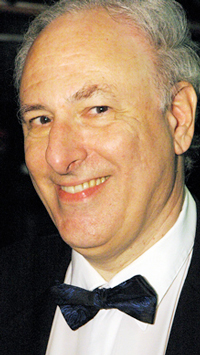by Daniel Hathaway

Cooper began his harpsichord studies with Sylvia Marlowe, one of the modern champions of the instrument, who was attracted to the instrument through concerts given by Wanda Landowska when Marlowe was studying with Nadia Boulanger in Paris. Cooper eventually succeeded her at the Mannes College of Music and now holds posts at Columbia University and the Manhattan School of Music where he chairs the harpsichord department and directs the Baroque Aria Ensemble. He serves as music director of the Berkshire Bach Ensemble and appears regularly with Paula Robison at the Metropolitan Museum of Art as well as on such series as the Yale-Norfolk Summer Chamber Music Festival and Music at Menlo.
His forty-year career as a specialist in eighteenth-century music has yielded many recordings of the Baroque masterworks as well as a wide range of other music including ragtime, American music, documentary film soundtracks and even a video game.
We reached Kenneth Cooper at his home in New York after a busy week of opera conducting to ask about his forthcoming concert in Cleveland.
Daniel Hathaway: How did you choose the repertory for your concert with BlueWater?
Kenneth Cooper: I sent them a list of pieces I had in mind but it was Neil who suggested the de Falla. I’ve been very tightly scheduled. I just conducted a performance of John Eccles’s The Judgement of Paris in the Catskills last night with a fabulous cast of people, and earlier this week, one of my favorites, Handel’s Acis and Galatea, with grad students at the Manhattan School that took weeks and weeks of preparation. I’ve done the de Falla many times, so this was perfect.
DH: Since the de Falla was originally written in 1926 for Landowska and her modern Pleyel harpsichord, I have to ask what kind of instrument you’ll be using in Cleveland.
KC: I haven’t the slightest idea! I believe Neil made arrangements for a Dowd from somewhere, and I just took his word for it because he’s a great guy. I’ve played the de Falla many times on all kinds of different instruments and the piece presents an extremely difficult balance problem. I think de Falla was dreaming a bit. Using the harpsichord in an ensemble was rather new at that point and composers didn’t know how to give the illusion of dynamics as Scarlatti, Bach and Handel did.
Wanda Landowska was the unchallenged master of the harpsichord at that time and a fabulously great performer, and her Pleyel instruments were glorious in some ways — especially for up-close recording — but you couldn’t hear them from ten feet away. They had eight pedals and lots of color but not much projected sound.
There was an incident some years ago when I played the de Falla in Santa Fe on a rather tame instrument that was inadequate to the task so we had to be very careful with balances. When I got back to the City, I had a phone call from Andrew Porter’s secretary at The New Yorker asking if I would listen to a paragraph in a review he had written saying “the balance would have been better if Mr. Cooper had used the instrument for which it was written.” “Nothing could be further from the truth,” I said. She thanked me and they went ahead and ran the review anyway!
In the 80s, a historical instrument would have made for a better balance especially if was built with a naturally strong sound and voiced for concert purposes, which not everybody is doing these days because they are under the illusion that instruments were softer in the old days.
But if the players really listen to each other and take de Falla’s markings with lots of grains of salt, it works, though it took me a while to realize it was such a fabulous piece. After a performance in Ottawa, Eduardo Mata said he thought the concerto was de Falla’s greatest work — and that it was intensely serious. I agreed with him about the second movement, but not the rest, which is like Scarlatti, satirical and playful and maybe a bit ceremonial as the Spanish do sometimes.
DH: Let’s move on to talk about the Handel.
KC: This concerto isn’t played very often but it’s delicious and a little dangerous, written in a playfully demonic style. Though it sounds Handelian, he stole about 80% of it from his close friend Telemann. Handel subscribed to the first volume of Tafelmusik in 1733 and sent Telemann in Hamburg some species of tropical plants in return — that was Telemann’s hobby. Handel loved the music and especially a little e minor flute sonata. He must have said what he thought about a melody by Bononcini, “that’s too good a tune for him, he doesn’t know what to do with it.” So he took this sweet little flute sonata and made it into a concerto for keyboard and strings with the suggestion that the player improvise a prelude and fugue between the movements — which I’m not going to do. It’s an astonishing metamorphosis. The concerto wasn’t published until the 1790s, maybe because of all the borrowings. There are lots of opportunities for solos between the string ritornellos, giving the harpsichord a chance to be heard and opportunities to decorate the repeats in the second movement. There’s also a rather devilish cadenza about which I will say no more!
DH: I see that Bach’s third orchestral suite is also on the program. Will you be doing some conducting on Saturday as well?
KC: Neil asked me if I wanted to conduct and I’ve done this piece many times — but he’s also a fantastic trumpeter and I’ve done it a number of times with him. I’ll do whatever he likes. But I’m not sure I want him playing the continuo! (laughs)
Published on ClevelandClassical.com April 29, 2013
Click here for a printable version of this article.



